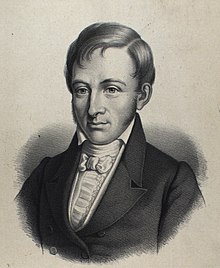Rasmus Christian Rask
| Rasmus Rask | |
|---|---|
 |
|
| Born |
Rasmus Christian Nielsen Rasch November 22, 1787 Brændekilde, Denmark |
| Died | November 14, 1832 (aged 44) Copenhagen, Denmark |
| Cause of death | Tuberculosis |
| Nationality | Danish |
| Academic background | |
| Alma mater | University of Copenhagen |
| Academic work | |
| Discipline | Linguistics, Philology |
| Sub discipline |
Historical linguistics Comparative linguistics |
Rasmus Kristian Rask (Danish: [ˈʁɑsmus ˈkʰʁæsd̥jan ˈʁɑsɡ̊]; born Rasmus Christian Nielsen Rasch; sometimes rendered as Erasmus Rask; 22 November 1787 – 14 November 1832) was a Danish linguist and philologist. He wrote several grammars and worked on comparative phonology and morphology. Rask traveled extensively to study languages, first to Iceland, where he wrote the first grammar of Icelandic, and later to Russia, Persia, India, and Ceylon (now Sri Lanka). Shortly before his death, he was hired as professor of Eastern languages at the University of Copenhagen. Rask is especially known for his contributions to comparative linguistics, including an early formulation of what would later be known as Grimm's Law.
Rask was born to Niels Hansen Rasch and Birthe Rasmusdatter in the village of Brændekilde near Odense on the Danish island of Funen. His father, a smallholder and tailor, was well-read and had a decently-sized book collection. As a child, Rask's scholastic abilities became apparent, and, in 1801, at the age of thirteen, he was sent to the Latin school in Odense, now known as the Odense Katedralskole One of his friends from Latin school, Niels Matthias Petersen (1791-1862), who went on to be the first professor of Nordic languages at the University of Copenhagen, later remarked that "His short stature, his lively eyes, the ease with which he moved and jumped over tables and benches, his unusual knowledge, and even his quaint peasant dress, attracted the attention of his fellow students". This is where Rask's interest in Old Norse and Icelandic language and literature was awakened. His teacher, Jochum E. Suhr, loaned him a copy of Snorri Sturluson's Heimskringla, and the rector, Ludvig Heiberg, gave him a new translation as a prize for his diligence. By comparing the original work and the translation, he was able to make an Icelandic vocabulary, cross-referencing the Icelandic words with cognates in Danish, Swedish, German, Dutch and English. In addition to Danish and Latin, Rask studied Greek, Hebrew, French and German at Odense. An interest in orthography also led Rask to develop his own spelling system for Danish that more closely resembled its pronunciation, and it was at this time that he changed the spelling of his last name from "Rasch" to "Rask".
...
Wikipedia
